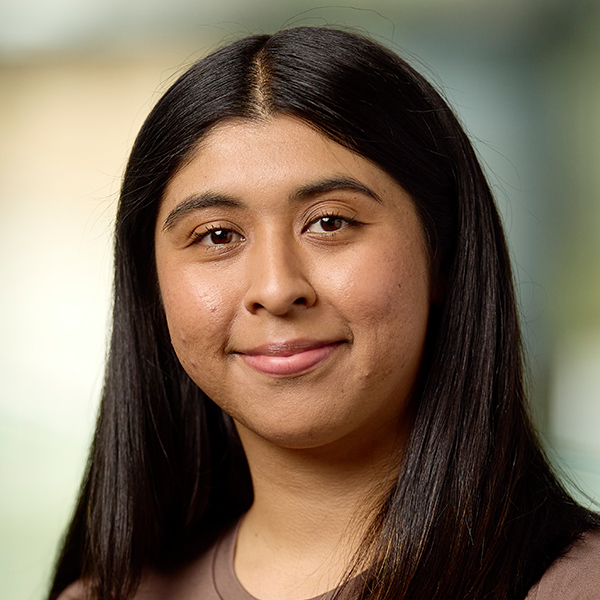Biography/Summary Resume
Elizabeth Melendrez is a dedicated professional with extensive experience in campus recreation at UNLV. Beginning her career as an undergraduate, she has worked in various roles including Facilities Attendant, Fitness Attendant, Youth Camp Counselor, and Building Manager. Elizabeth also served as a member of the Building Manager Hiring Committee, contributing to the recruitment and selection of new team members. With a passion for collegiate recreation, she has developed a strong foundation in facility management, customer service, and leadership. Her involvement in NIRSA reflects her commitment to advancing the field and creating positive experiences for students and the campus community.
Please provide a statement of your personal views on the role and contributions of collegiate recreation in higher education. In your response, describe how collegiate recreation has influenced your development.
For me, collegiate recreation has significantly influenced my personal development. During my time working in recreation, I’ve honed skills such as problem-solving, communication, and event planning. As a Graduate Assistant for Special Events and Facilities, I’ve gained experience in managing logistics, collaborating with diverse groups, and adapting to changing circumstances, all while creating positive experiences for students. This exposure to various aspects of collegiate recreation has enhanced my ability to lead and support others in a dynamic environment.
Ultimately, collegiate recreation helps shape students into well-rounded individuals by supporting their academic, social, and emotional growth. My experiences within the field have not only influenced my development but have inspired me to continue contributing to an inclusive, engaging, and well-supported campus community.
Within the context of the NIRSA Strategic Plan, what area/item would you say is a major issue students face today? How would you address this issue during your term?
A major issue students face today, particularly within the context of the NIRSA Strategic Plan, is mental health and well-being. As the pressures of academic life, social connections, and personal development weigh heavily on students, the demand for recreational programs that promote mental health, stress relief, and overall wellness has significantly increased. Collegiate recreation facilities and programs are uniquely positioned to support students’ mental and emotional health through both structured and unstructured activities that foster relaxation, connection, and physical wellness.
To address this issue during my term, I would prioritize enhancing access to mental health support through recreational initiatives that integrate physical and mental wellness. This could include expanding mindfulness and stress-relief programs such as yoga, meditation, and fitness challenges that provide students with positive outlets for managing stress.
Describe your contributions to NIRSA (i.e. presentations, volunteering, previous leadership roles, etc.) and identify how your involvement and experiences qualify you to advocate for and serve the students of the Association.
My involvement with NIRSA has provided me with invaluable opportunities to grow as a leader and advocate for collegiate recreation. Throughout my time in the field, I have actively volunteered at NIRSA events, contributed to campus recreational programs, and worked closely with student leaders to improve the overall student experience. These experiences have helped me better understand the needs of students and the role NIRSA plays in shaping the future of collegiate recreation.My work as a Graduate Assistant for Special Events and Facilities has further prepared me to advocate for and serve students within NIRSA. Through this role, I have gained hands-on experience managing student-led projects and events, which has strengthened my understanding of the needs of student populations and how recreation can be used as a tool to enhance their well-being. By listening to students and responding to their feedback, I’ve been able to create more impactful programs that align with their interests and needs.
These experiences, combined with my passion for collegiate recreation, equip me to advocate for the students of NIRSA. I believe in the power of recreation to positively influence the student experience, and I am excited to use my background and knowledge to support and elevate the voices of students within the association.
The Student Leadership Team focuses on student development and Student Member recruitment and retention. What skills, talents, and perspectives would you bring to the Student Leadership Team that would contribute to this focus?
In terms of student development and member recruitment and retention, I believe I bring a strong combination of leadership, communication, and organizational skills, all of which will help contribute to the success of the Student Leadership Team’s goals.
First, my experience as a Graduate Assistant for Special Events and Facilities has provided me with valuable insights into planning and managing student-centered programs that foster engagement and development. I’ve had the opportunity to collaborate with diverse groups of students, which has enhanced my ability to tailor initiatives that address their unique needs and interests. I can apply this knowledge to support the recruitment of new members by creating events and opportunities that resonate with students’ personal and professional goals.
Additionally, my ability to communicate effectively across various platforms will be an asset to the team. I am comfortable working with social media, email campaigns, and in-person interactions, which allows me to connect with students and keep them engaged. Whether it’s promoting NIRSA membership or developing retention strategies, my communication skills will help ensure that students feel informed, connected, and valued.
I also bring a collaborative mindset, where I actively listen to others, encourage diverse perspectives, and foster an inclusive environment. This aligns with the need to build a strong, supportive community within NIRSA, ensuring that students feel like they belong and have a voice in shaping the direction of the organization. I understand the importance of making sure that every member feels supported and included, which is key to retention.
Lastly, my background in recreation has given me the ability to think creatively and outside the box. I am passionate about finding new and innovative ways to engage students and help them see the value of being part of NIRSA. Whether through unique events, leadership development programs, or new member engagement strategies, I’m eager to bring fresh perspectives to the team and contribute to both recruitment and retention efforts.
Describe your leadership style. How will it benefit you and the rest of the Student Leadership Team?
My leadership style is collaborative and supportive. I believe in fostering an environment where every team member feels valued and encouraged to contribute their ideas. By actively listening to others and promoting open communication, I aim to create a space where everyone’s strengths are highlighted, and challenges are addressed together. In my experience working in recreation for over 2.5 years, I’ve learned that a team thrives when there’s a shared purpose and mutual respect.
This approach benefits the Student Leadership Team because it ensures that all voices are heard and that we work together to find creative solutions to any obstacles we may encounter. As a Graduate Assistant for Special Events and Facilities, my role often requires balancing different perspectives, and I’ve found that by being both a facilitator and a guide, I can empower my peers to excel and take ownership of their work. Ultimately, this style fosters both individuals. Please provide a statement of your personal views on the role and contributions of collegiate recreation in higher education. In your response, describe how collegiate recreation has influenced your development.
As a member of the Student Leadership Team, you have the opportunity to leave a lasting impact on the field of collegiate recreation. However, we acknowledge and respect that you are a student first. Explain your strategies for maintaining a healthy balance between your various roles (student, volunteer, athlete, employee, etc.).
As a graduate assistant for special events and facilities at UNLV, I maintain a healthy balance between my roles as a student, employee, and volunteer through effective time management, setting clear boundaries, and prioritizing self-care. I use digital tools to organize my schedule and break tasks into manageable pieces, ensuring that I allocate time for both my academic and professional responsibilities. I also recognize the importance of physical and mental well-being, incorporating regular exercise and downtime into my routine. By staying focused on my long-term goals in collegiate recreation and seeking support when needed, I ensure that I can contribute meaningfully to my roles without compromising my overall health and academic success.



